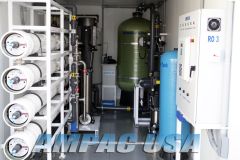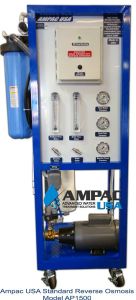Description
All Ampac USA reverse osmosis bottled water systems consistently deliver high quality treatment whether it is operated during low flows, intermittent or peak flows. They sanitize and distribute the clean drinking water to the bottling sources efficiently. Each water store RO system is specially customized for reverse osmosis water treatment to minimize operator time. They are equipped with smart on demand supply pump with flow control, followed by ion removal and pH balancing post-treatment to further improve the taste of purified water. The post-treatment water is considered to be potent or drinkable and ready for bottling. When bottled liquids need extension of the minimum shelf life, say from 6 months to 5 years or more, bottlers add ozone to the finished product.
One of the best reverse osmosis bottled water systems for application in bottling beverage plants, is Ampac USA’s AP3000-SM advanced water store reverse osmosis system. It is capable of producing 3000 gallons of pure fresh drinking water, every day, and is commonly applied in bottling plants. Besides water stores, the RO model is useful in food and beverage production, as well as pharmaceuticals requiring pure reverse osmosis water treatment. Effective ion exchange ensures regeneration by reducing the calcium, magnesium, iron, manganese dissolved as salts in the water source. Ions are exchanged for other salts with sodium or potassium with water softeners like zeolite or resin. It is significant stage and component of every RO water system, especially when applied to land based, off-shore and marine Sea Water Desalination (SWROs).
One of the ways to better save precious water on our blue planet is to recycle whenever possible. It is also important to recycle and re-use the waste water from the process plants and conserve water for future generations. Sometimes huge wealth of minerals are dissolved in mining effluents that appear to be waste, but are, in fact, anything but that. Mines offer treatment programs that offer innovative solutions for mineral processing including copper, alumina, coal, gold, silver, platinum, potash, iron ore and other industrial minerals. Similarly, the effluent water can be recycled in other process plants easing the burden of water shortage and droughts in many countries.
Applications














